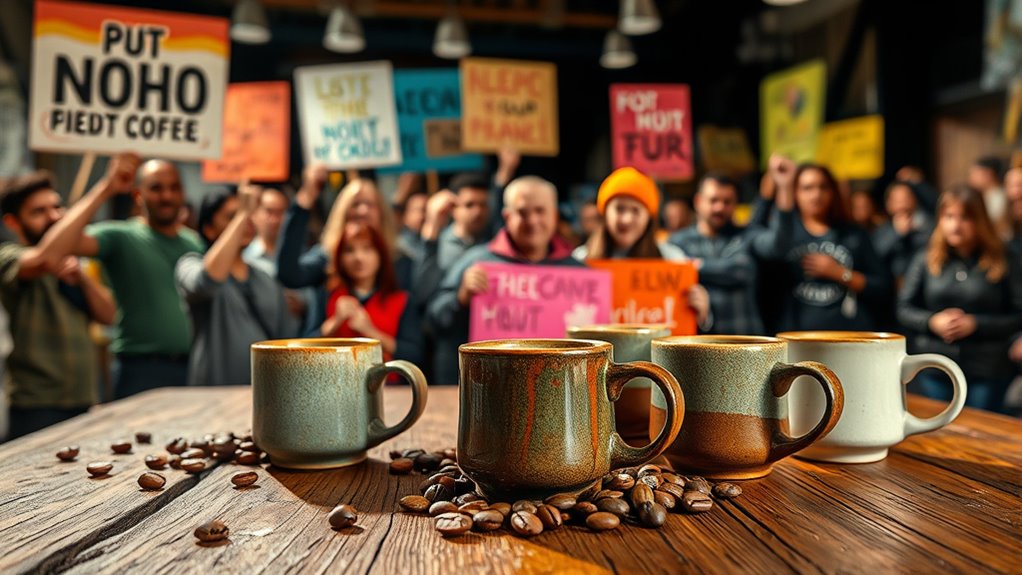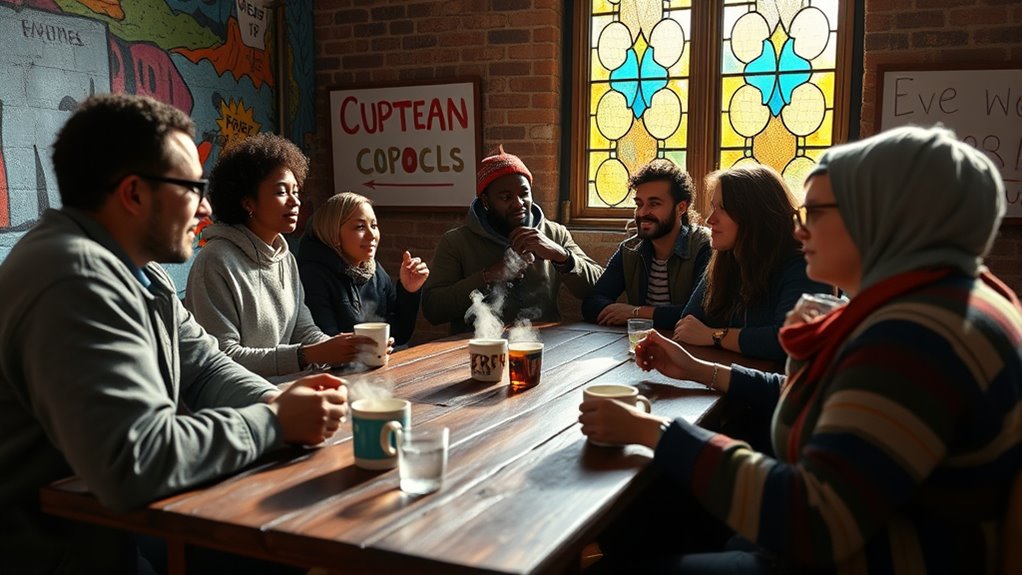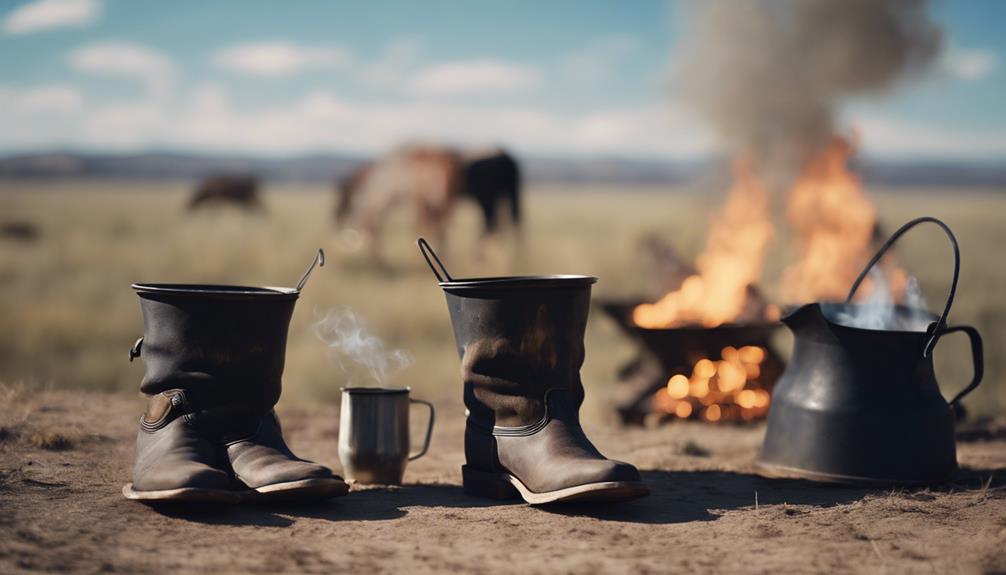Coffee connects people globally and has historically been a catalyst for social movements. From serving as spaces for activism to supporting fair trade initiatives, it fosters community and solidarity. Coffee shops often host discussions, campaigns, and protests, symbolizing resistance and social change. Ethical sourcing and certifications empower consumers to make responsible choices, strengthening social justice efforts. Want to discover how coffee continues to shape activism today and fuel community mobilization? Keep exploring the powerful role coffee plays in social movements.
Key Takeaways
- Coffeehouses historically served as venues for social activism and community organizing during major social movements.
- Fair Trade coffee supports social justice by promoting ethical sourcing and empowering farmers in developing countries.
- Modern coffee shops act as community hubs, fostering discussions and mobilization around issues like climate change and workers’ rights.
- Ethical sourcing certifications influence consumer choices and encourage industries to prioritize social and environmental responsibility.
- Coffee symbolizes solidarity, acting as a social lubricant and a tool for activism and collective action in various social movements.

Have you ever wondered how a simple cup of coffee can serve as a powerful tool for social change? Throughout history, coffee has played a significant role in supporting social movements and activism. Coffeehouses have long been more than just places to sip a warm beverage—they’ve served as essential community spaces where ideas are exchanged, strategies are planned, and voices are united.
From the debates on independence in colonial America to anti-apartheid protests in South Africa, these venues became protest venues that fostered solidarity and collective action. You mightn’t realize it, but when you buy fair trade coffee, you’re participating in a broader movement for social justice. This type of coffee emphasizes ethical sourcing, ensuring that farmers receive fair wages and work under sustainable conditions.
Buying fair trade coffee supports social justice and sustainable farming practices worldwide.
By choosing fair trade coffee, you’re helping to empower communities in developing countries, giving them a voice and a stake in the global economy. Modern coffee culture continues to support activism by encouraging community engagement through events, open debates, and campaigns focused on environmental sustainability and workers’ rights.
Coffee shops often serve as hubs for activists, providing neutral spaces where diverse groups can gather to discuss critical issues. These gatherings foster a sense of solidarity, making it easier to mobilize for causes like climate change, fair labor practices, or anti-corruption efforts.
Ethical sourcing certifications play an indispensable role here, as they allow consumers like you to make informed choices that align with your values. When you opt for products with these certifications, you’re directly influencing industry standards and encouraging companies to prioritize social justice in their supply chains.
The influence of coffee on social movements isn’t just historical; it remains a living part of today’s activism. Whether it’s through community-led initiatives or supporting fair trade coffee brands, your participation helps sustain these efforts.
Coffee’s neutrality as a social lubricant makes it an ideal symbol of resistance—bringing people together to discuss and strategize for change. When you buy ethically sourced coffee, you’re not just supporting farmers and their communities; you’re investing in a global movement that champions sustainable practices, fair wages, and social justice.
Additionally, understanding the importance of Getting Unstuck can help activists and community organizers overcome barriers to action, ensuring continuous momentum in social movements. In this way, your simple act of drinking coffee becomes a form of activism—an everyday act of solidarity with those fighting for a better world.
Frequently Asked Questions
What Is the Social Impact of Coffee?
You mightn’t realize it, but coffee has a powerful social impact. It brings people together, sparks conversations, and fosters community bonding.
When you buy fair trade coffee, you’re supporting fair wages and better living conditions for farmers.
Coffeehouses serve as spaces for activism and dialogue, helping shape social change.
What Role Does Coffee Play in Society?
You see, coffee plays a significant role in society by bringing people together. It acts as a social catalyst, encouraging conversations and connections in cafes and communal spaces.
You might notice how coffee promotes community bonds through shared rituals and cultural practices. Additionally, it inspires activism by supporting ethical sourcing and social justice efforts, making it a symbol of unity, resilience, and collective action across diverse communities worldwide.
What Triggers Social Movements?
You see, social movements are triggered when shared grievances about injustice, inequality, or oppression reach a boiling point. Significant events, economic struggles, or political crises often ignite these feelings.
You’re likely to notice that social networks, whether in coffeehouses historically or online today, help spread ideas and organize action.
Leaders framing issues with moral urgency and cultural symbols, like coffee, can unify and motivate communities to mobilize for change.
What Is the Social Aspect of Coffee?
You recognize that coffee plays an essential social role. It brings people together, creating a space for conversation, connection, and community building.
Sharing coffee encourages bonding and fosters cultural exchange. Whether in traditional settings or modern cafes, it acts as a catalyst for social interaction, breaking down barriers and promoting dialogue.
Coffee’s social aspect lies in its ability to unite individuals, spark relationships, and support collective engagement.
Conclusion
As you see, coffee isn’t just a morning pick-me-up; it’s a catalyst for social change. By supporting fair trade and ethical practices, you play a part in empowering communities and promoting justice. Your choices can challenge injustice and foster movement toward a more equitable world. So, next time you sip your coffee, remember that your simple act can contribute to larger social movements, making a difference one cup at a time.









